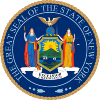John R. Lewis Voting Rights Act of New York
| John R. Lewis Voting Rights Act of New York | |
|---|---|
 | |
| New York State Legislature | |
| Acronym | NYVRA |
| Assembly voted | June 2, 2022 (106-43) |
| Senate voted | May 31, 2022 (43-20) |
| Signed into law | June 20, 2022 |
| Governor | Kathy Hochul |
| Section | N.Y. Elec. Law § 17-210 |
| Bill | S.1046-E / A.6678-E |
Status: Partly in force | |
The John R. Lewis Voting Rights Act of New York (NYVRA) is a State Voting Rights Act (SVRA) modeled after the federal Voting Rights Act that is designed to prevent racial voter suppression and discrimination. It is named after the late civil rights activist and Congressman John Lewis.[1] The act prohibits voter suppression, including vote dilution, voter intimidation, voter deception, and voter obstruction. It also establishes preclearance requirements for certain jurisdictions as well as expanded requirements for jurisdictions with a certain number of adult citizens with limited English proficiency.[2]
Legislative history
[edit]The NYVRA was introduced in the New York Senate as S.1046-E and in the New York Assembly as A.6678-E. On May 31, 2022, it passed the New York State Senate by a vote of 43 in favor and 20 against.[3] On June 2, 2022, it passed the New York State Assembly by a vote of 106 in favor and 43 against.[4] On June 20, 2022, Governor Kathy Hochul signed the NYVRA into law.[5]
Key provisions
[edit]Preclearance
[edit]The act creates a preclearance requirement for certain jurisdictions with a history of discrimination. These jurisdictions must seek approval from the New York Office of the Attorney General or a state court before making certain changes to their election procedures. This provision is modeled after Section 5 of the Voting Rights Act of 1965, which has been inactive since 2013 following the Supreme Court Case Shelby County v. Holder. The preclearance requirements of the NYVRA go into effect on September 22, 2024.[2]
Lawsuit
[edit]NYCC v. Nassau County
[edit]On February 7, 2024 a group of organizations, including New York Communities for Change, filed a lawsuit against Nassau County over the redistricting maps passed by the Nassau County Legislature. The lawsuit includes allegations that the redistricting plan violates the NYVRA. A case determining the constitutionality of state voting rights acts may ultimately wind up before the U.S. Supreme Court.[6][7]
On November 9, 2024, Orange County state court Justice Maria Vazquez-Doles struck down the law as unconstitutional, per recent decisions by the United States Supreme Court. State Senator Zellnor Myrie, a sponsor of the bill, indicated that the decision would be appealed.[8]
See also
[edit]- Voting Rights Act of 1965
- California Voting Rights Act
- Voting Rights Act of Virginia
- Washington Voting Rights Act
- John R. Lewis Voting Rights Act of Connecticut
References
[edit]- ^ "New York passes landmark voting rights legislation". AP News. 2022-06-20. Retrieved 2024-01-15.
- ^ a b "Voting Rights | New York State Attorney General". ag.ny.gov. Retrieved 2024-01-16.
- ^ "2021-S1046E". NYSenate.gov. Retrieved 2024-01-15.
- ^ "Bill Search and Legislative Information | New York State Assembly". nyassembly.gov. Retrieved 2024-01-16.
- ^ "Governor Hochul Signs Landmark John R. Lewis Voting Rights Act of New York Into Law | Governor Kathy Hochul". www.governor.ny.gov. Retrieved 2024-01-16.
- ^ "A voting rights battle in a New York City suburb may lead to a national fight". NPR.
- ^ "DocumentCloud". www.documentcloud.org. Retrieved 2024-02-10.
- ^ "Judge strikes down New York law intended to protect minority groups' voting power"
